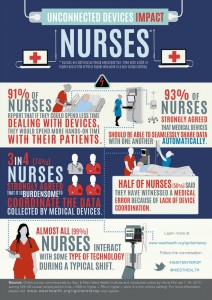Sixty percent of nurses believe that medical errors could be reduced if medical devices were able to seamlessly share information, according to results from an online survey of more than 500 nurses commissioned by the Gary and Mary West Health Institute.
“Missed Connections: A Nurses Survey on Interoperability and Improved Patient Care,” canvassed 526 nurses credentialed at RN or higher and with an education of BSN or higher who work in a non-school setting. The weighted survey was conducted by Harris Poll January 7-16, 2015. Half of respondents reported witnessing medical errors due to a lack of coordination among the devices responsible for testing, monitoring, and treating patients, while 46% said that an error is extremely or very likely to occur when information has to be manually transcribed between devices.
“Nurses are the front line of patient care and have an unrivaled ability to identify and address problems at the intersection of patients and technology,” said Joseph Smith, MD, PhD, West Health Institute’s chief medical and science officer. “The survey helps show how much of a nurse’s time could be better spent in direct care of patients and families, and how errors could be potentially avoided if medical devices, which have been so successful at improving patient care, were able to take the next step and seamlessly share critical information around the patient’s bedside.”
The Journal of Patient Safety estimates that more than 400,000 patients die each year in the United States from preventable medical errors, at a projected cost of a trillion dollars or higher annually, according to an article published in the Journal of Health Care Finance. Medical device interoperability—the ability to automatically exchange health data across devices such as infusion pumps, ventilators, pulse oximeters, blood pressure cuffs, and electronic health records—could save as much as $30 billion per year by reducing redundant testing, manual data entry, and transcription errors, according to research by the West Health Institute.
The survey also reported that 69% of nurses surveyed believe that manually transcribing data is very likely to take time away from patients. Nearly all of those surveyed (93%) strongly or somewhat agreed that medical devices should be able to exchange data automatically.
“It’s time that we free our healthcare workers to do what they do best and what they are most needed for, which is caring for patients,” Smith said. “Let’s not ask busy clinicians to do those things that technology can automate easily and effectively. Medical device interoperability can save lives, time, and money, and at the same time allow nurses to focus on caring for patients.”
The full “Missed Connections” survey can be downloaded at the West Health Institute website.




